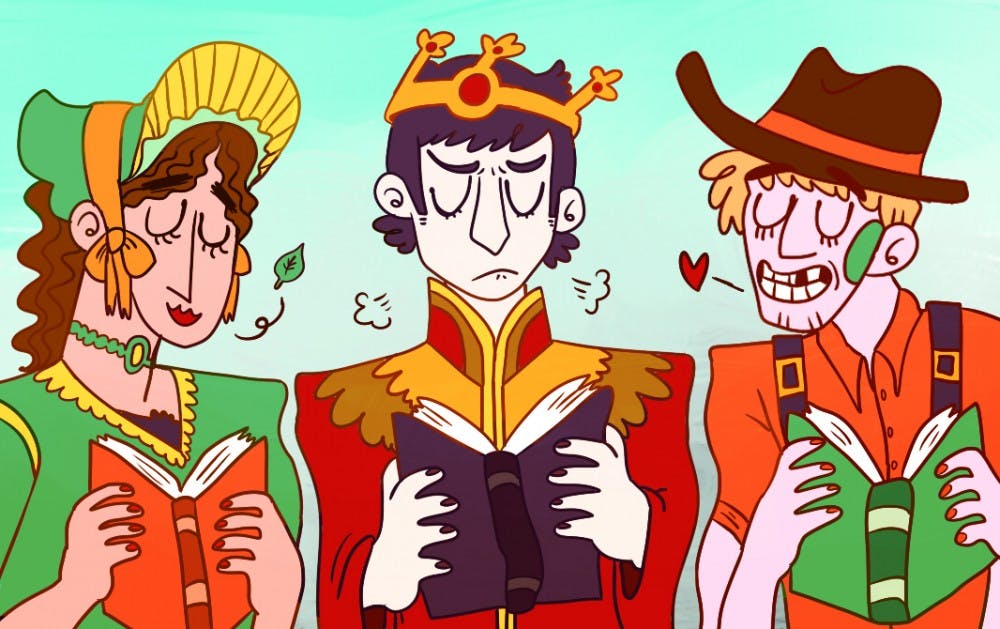Literature might unveil more than we might think about emotions that reflect a specific time and place, or even show how emotions have changed, or remained fairly similar, throughout time.
Bradley Irish, an assistant professor in the Department of English at ASU, discusses the power literature has when it comes to unveiling these emotions in his debut book, “Emotion in the Tudor Court: Literature, History, and Early Modern Feeling”.
In this novel, Irish dives into four different emotions: disgust, envy, rejection and dread.
Irish said in an email that he is fascinated by all four emotions, but envy has stood out to him as a particularly important emotion in early modern England. He said that this is so much so, he is now working on a book specifically about envy and jealousy in the period.
Though Irish is primarily a literary scholar, he said that he has always been interested in what makes people tick.
“I became interested in emotion specifically during my doctoral work at The University of Texas at Austin, when I realized that thinking about how people feel can give us insight into so many other features of human behavior, including the literature that they create,” Irish said.
Dana Tait, a Senior Lecturer in the Department of English, said in an email that literature is a product of a mind and an imagination, along with the experiences of that person during his or her lifetime.
“Emotion is part of the human experience, regardless of the culture or time period,” Tait said. “Emotions are what help to define us as human. A lot of students and modern readers may be intimidated by literature from previous centuries, for example Shakespeare’s plays, but Shakespeare gave us so many examples of human emotion and experience in his plays.”
Tait said that people tend to call these works timeless, as if they aren’t still a product of that time period, but she said it is really about how relevant or timely the themes remain for modern people, because they represent what it means to be human.
“Literature, regardless of when it was composed, is like a living thing and is alive to new readers and new interpretations,” Tait said. “Studying the context of the author’s life and society can tell us many things about what was happening and how people of that time period felt about it, and that’s what scholarship on both literature from the past and that of today tells us.”
Meghan Nestel, a graduate student and faculty associate in the ASU Department of English, said in an email that emotions are one of the unifying elements of human experience, and that people can generally relate to each other, or conflict with each other, through those emotions.
“This is not to say all emotions are consistent throughout time or place, as cultural, social and economic factors can influence how emotions are experienced and expressed, but much remains similar enough that we can identify with emotions from hundreds of years ago,” Nestel said.
Nestle said that literature reflects the emotions of its time, but can also shape how future emotions develop.
“If literature that discusses feeling guilt in response to a certain action becomes widely read and accepted, for example, then future generations may feel guilt at that action because the literature has told them they should,” Nestle said. “By studying emotions in older literature, researchers can gain understanding of when and why emotions took on their modern meanings.”
Nestle said that this type of research would require tracing origins of words and analyzing older literary texts. She also said that researchers may also conduct surveys to better understand modern emotions in comparison to emotions in older literature.
Irish studies both how emotions are reflections of a particular historical time and place, and also how emotions transcend those specific temporal and local boundaries.
“Research from many disciplines suggests that emotions have some elements that are shaped by history and culture, and some elements that are transcultural and transhistorical,” Irish said. “Indeed, part of the argument of the book is that we need to consider both sides of the coin to understand them fully.”
Irish focuses on emotions specifically in early modern England, which is his area of expertise.
“The book's overall method, which marries the insights of the sciences and the humanities, can be applied to any historical moment,” Irish said. “It's my hope that other people working in different chronological periods will find some value in it.”
Irish said that the most fascinating parts of his studying the past is learning how people who lived before us seem both incredibly familiar and incredibly distant.
He said that any researcher can adopt the method of his book.
“It simply involves paying attention to what experts in the sciences are saying about emotion, and bringing that knowledge to bear on the work that we're already doing in the humanities on emotion,” Irish said.
Irish’s book is also open-access, which means that it is only a quick, free download away.
“I want to share my ideas and enthusiasm for early modern literature and culture with as many people as possible,” Irish said. “I didn't want there to be any barriers to access. I feel so grateful that anyone interested can download the book at the click of a button, and read it anywhere in the world.”
Reach the reporter at jlmyer10@asu.edu or follow @jessiemy94 on Twitter.
Like The State Press on Facebook and follow @statepress on Twitter.




